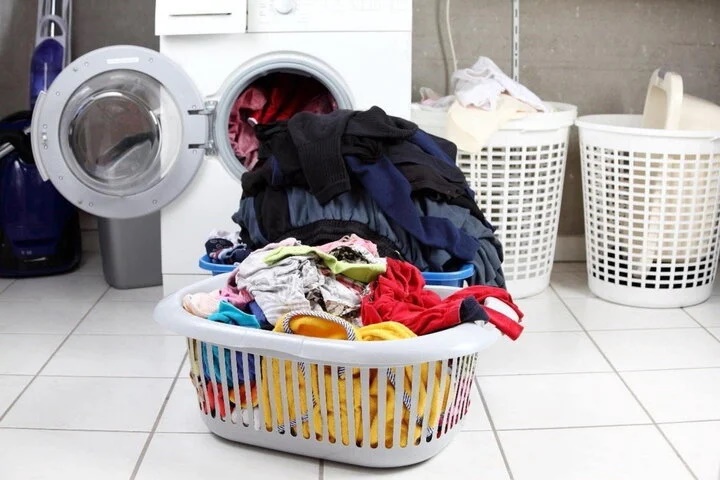The load capacity of washing machines is indicated in kilogram units. It represents the maximum weight of laundry that the machine can effectively clean without wasting electricity, water, or excess time. However, many people still wonder if the weight indicated on the washing machine is for dry clothes or wet clothes.
Is the weight on the washing machine for dry clothes or wet clothes?
The numbers 7kg, 10kg… on washing machines indicate the maximum weight of dry clothes that you can put in the machine for each wash. This is different from dryers, where the load capacity is calculated based on the weight of wet laundry.
If you wash too few clothes compared to the load capacity, you will waste electricity and water, while washing too many clothes may lead to ineffective cleaning. Therefore, it is recommended to wash a sufficient amount of laundry, ideally around 70% – 80% of the machine’s capacity, to achieve optimal cleaning results.

Is the load on washing machines for dry or wet clothes? The answer is dry clothes. (Image: E-Katalog)
For example, if your washing machine has a load capacity of 9kg, you should only put in about 7 – 8kg of clothes. It is strongly advised not to exceed the maximum load of 9kg to avoid overloading the machine, which can lead to damage and ineffective cleaning. You can weigh or estimate the weight of clothes based on the fabric material and length to determine the exact load.
All washing machines have a minimum water level. Even if you put in a small amount of laundry, the machine will still pump enough water to start the wash cycle. The larger the machine’s capacity, the higher the minimum water level. If you put too little laundry, the clothes may not be properly agitated during the wash and may not be thoroughly cleaned.
In addition to weight, we also need to consider the size of the clothes when washing. Some fabrics can expand significantly when wet, such as wool garments, so only a small amount should be put in the machine. If too much is added, the machine may have difficulty operating normally.
In summary, it is important to remember that the load capacity on washing machines is for dry clothes, and the amount of clothes should not exceed 2/3 of the drum height. Avoid packing the clothes too tightly to ensure optimal cleaning efficiency.
Some consequences of washing too much or too little
Overloading (putting more laundry than recommended by the manufacturer) can result in the following harmful consequences:
– Incorrect distribution of items in the drum: This can cause excessive vibrations during the spin cycle, and the machine may reduce its speed or completely stop the spin mode. In this case, you may need to manually rearrange the items in the drum or remove wet clothes.
– Impact on the motor: When you overload the machine, the motor has to work at high speed, causing it to heat up and reducing its lifespan.
– Damaged drum: Cracks and leaks can occur. A heavy load will increase the wear and tear on the bearings, damage the shock absorbers or cause belt breakage.
– Ineffective cleaning: Putting too much laundry in the drum can result in uneven cleaning, with some items remaining dirty.
– Clothes wear out quickly: Due to overloading, the friction between clothes and between clothes and the drum increases. This leads to faster fading and loss of shape.
If you put too little laundry in the machine, during the spin cycle, the small amount of laundry may not distribute evenly in the drum, which increases vibrations and is not good for the machine. Therefore, the amount of laundry should not be less than 20% of the drum volume.
Source: VTC
The Risk of Underestimating Getting Caught in the Rain
No matter the weather, getting caught in the rain can be an unwelcome occurrence. While one may think that it’s no big deal, it’s important to take measures to get yourself dry and warm after such an experience. Don’t underestimate the effects of the rain – it can be more damaging than one may think.





































